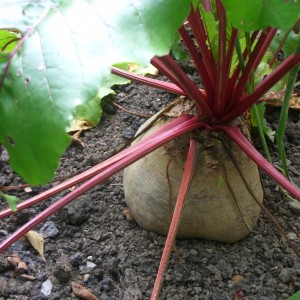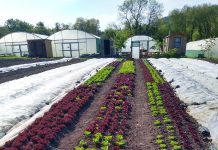Beetroot are so easy to grow, they mature quickly, and are such a sweet and rich vegetable. Not everyone loves it because it tickles their insides, but those that do should read on.
Like all seedlings, beetroot are tasty to slugs, and the young leaves can be eaten as spinach. Sown into moist warm soil in May, germination is quick and successful. But to harvest your first beetroot by late May, my preferred method is to sow indoors in module trays. Either plant one in each module, and plant out at 8” x 8” spacing, or plant 4 seeds, one in the corner of each module, and later plant out at 16” x 16” spacing.
Sowing in mid-February in the greenhouse means seedlings are ready to plant out 6-8 weeks later. Best then kept under fleece until the end of April, the first small roots are ready to eat soon after. Sowing in modules is so much easier than sowing in the soil, simply requiring daily watering.
The plants remain fairly small until May, when growth can be meteoric. The key to all good plant growth is heavy dressings of organic matter. Scatter as much as you dare on top of the soil between plants, which will mulch the soil and then feed the plants.
It works well if you pull the biggest roots first, leaving the smaller plants to fill the space left behind. You can keep pulling ever bigger roots until October. If your soil is rich and the plant has healthy, luscious leaves, this first sowing will be sweet as sweet all the way until October, even though there may be signs of the roots becoming white and woody when cut open. A good sign of this is that the leaves cease to look fresh and begin to die back, in preparation to seed next year. Pick if this happens.
For winter beetroot, you are best to make a second sowing in May or June. This will give you a second harvest, and roots that have a good chance of staying sweet into the winter. As you read this, we are still pulling beetroot and making Bortsch. This splendid winter soup is also a good way of using up any dessert apples which have gone soft, but which sweeten the soup a treat. The taste would make a Pole happy!
Beetroot is a close relative of spinach, and young leaves can be cooked in the same way as their cousins, adding a dash of colour to a dish. How satisfying, nothing is wasted.
My preferred varieties are still Detroit 2 and Boltardy. The name Boltardy refers to the fact that the plant can rise to flower, but in my experience this only happens in impoverished or dry soil, or when planted much too close. Once established, there are really no pests except mammals, which should be casseroled on sight. As we approach Easter, what happens if you pour a boiling kettle into a rabbit hole? Of course, you get Hot Cross Bunnies.









